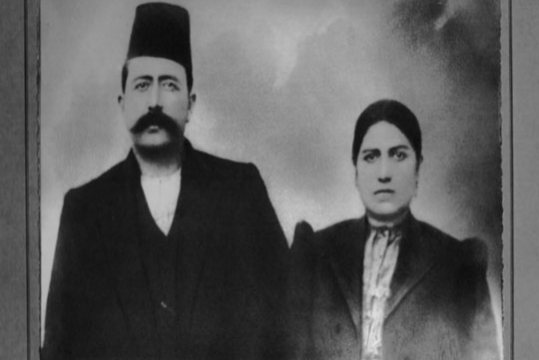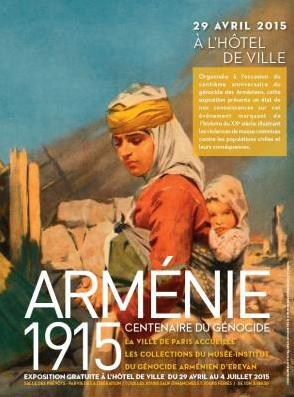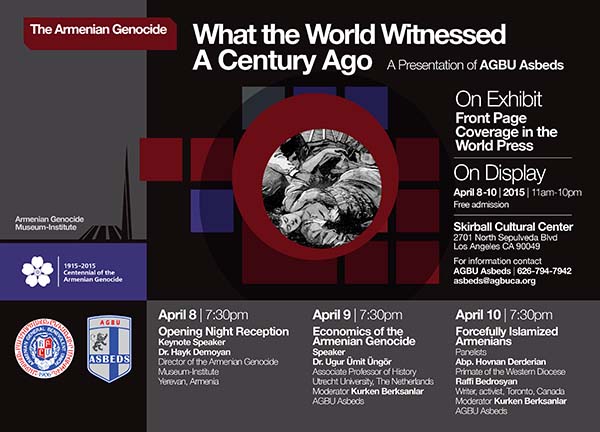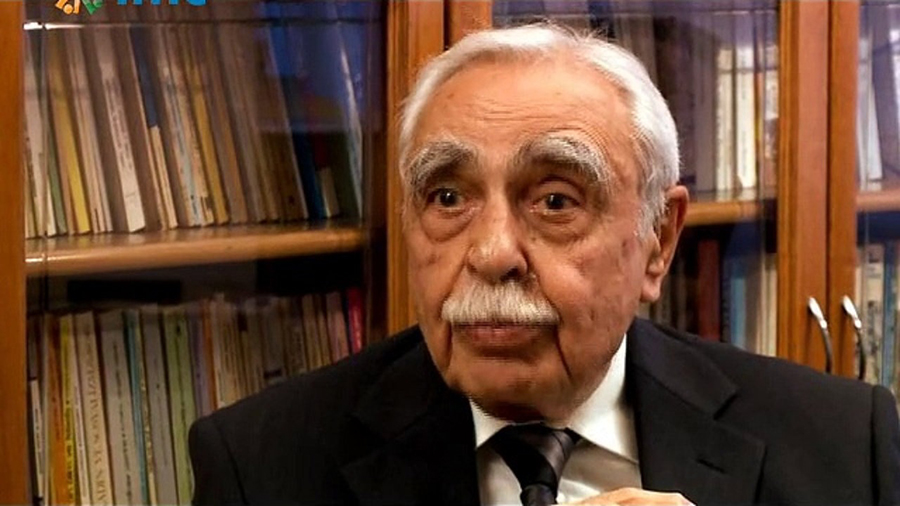By Lucy DerTavitian
www.jewishjournal.com
If you can …
Imagine a monument dedicated to Hitler in the heart of Berlin. Picture yourself passing a statue of the brutal dictator as you stroll down Nowy Swiat in Warsaw. See yourself dropping off your 6-year-old at Hitler Elementary School. Envision people running into the Hitler Missionary Community Church on the doorsteps of Brandenburg Gate to light a candle for the all the Nazis who died during World War II. Imagine our history books omitting the Holocaust.
Replace Hitler with Talat Pasha, and that is my reality.
Talat Pasha, the main architect of the Armenian genocide — the man responsible for the systematic annihilation of 1.5 million Armenians, is revered in Turkey today as a national hero. Monuments stand in his memory, streets carry his name, mosques uphold his legacy, and public schools turn a villain into a hero.
Talat Pasha’s extermination order reached my grandfather’s home in Malatya, Turkey, in April 1915. His mother, with her newborn in hand, was taken away from their home, never to be seen again. Her image never left him. His father was murdered because he refused to convert to Islam. An apprentice of my great-grandfather’s had tricked the oldest of the siblings into handing over the massive family wealth. When she realized that she had been deceived, she suffered a stroke and died. She was 15 years old. In order to save themselves, the remaining four children, ages 3 to 12, converted to Islam. My grandfather Kevork became Bakeer. Knowing that conversion meant only temporary relief from death, they escaped to Aleppo, Syria, and spent the remaining years of their childhood in an orphanage.
The weight of the Holocaust is shared by all of mankind — as it should be. The ultimate crime against humanity is not simply Jewish history; it is the history of any ethical citizen of our planet. And like the Holocaust, the Armenian, Assyrian and Greek genocides are crimes against man as well, and must be borne by us all.
Unfortunately, the State of Israel, a nation comprising daughters and sons of Holocaust survivors, refuses to acknowledge the Armenian genocide. Yet the contributions of Jewish scholars and intellectuals to the Armenian cause have been significant. In fact, it was this brutal chapter of Armenian history that propelled Polish-Jewish legal scholar Raphael Lemkin to coin the term genocide. Veteran journalist Robert Fisk has reported that the German officers, who trained the Ottoman soldiers during World War I, were later transferred to Soviet Russia in 1942 to kill Jews. And according to historian Edna S. Friedberg, Franz Werfel’s 1933 novel on the Armenian genocide, “The Forty Days of Musa Dagh,” inspired resistance among Jews in Warsaw.
When former Iranian president Mahmoud Ahmadinejad outrageously questioned the validity of the Holocaust, his remarks were, rightfully, met with swift and sharp condemnation from European and American leaders. Anything less would have been seen as a despicable acquiescence to his hateful speech. Yet, year after year, Israeli and American leaders refuse to recognize the Armenian genocide. According to Article 3 of the Genocide Convention, complicity in genocide is a punishable crime. The U.S. and Israel are signatories of that convention.
Politicians and scholars alike have widely acknowledged the historical facts of the Armenian genocide. The events have been studied thoroughly and the outcome is unequivocal. It was genocide. Even those who shy away from using the word in fear of Turkish reprisal do not question the validity of the term.
Today, it is a denial by name alone.
In 2008, then-Sen. Barack Obama declared, “America deserves a leader who speaks truthfully about the Armenian genocide and responds forcefully to all genocides.” A year later, President Obama told the Turkish Parliament that he had not changed his views on the events of 1915; however, he failed to use the word “genocide” for fear of repercussions to U.S. military bases in that country.
As a professor, Samantha Power dedicated a significant portion of the proceeds from her Pulitzer Prize-winning book, “A Problem From Hell,” to the Armenian genocide. As U.S. ambassador to the U.N., Power is prohibited from using the word genocide when speaking about the atrocities of 1915.
An article published by Roger W. Smith, Eric Markusen and Robert J. Lifton in the journal Holocaust and Genocide Studies demonstrated how the Turkish government is aware that the events of 1915 constituted genocide.
There is a reason why Lemkin dedicated his life to coining and defining the word. Genocide, unlike its synonyms — massacre, atrocity, mass murder — holds a distinct legal definition, one that was created not merely to punish but to prevent future genocide.
“Who, after all, speaks today of the annihilation of the Armenians?” — Adolf Hitler
This is not recognition for the sake of recognition; it is recognition for the sake of accountability. Accountability lies at the root of justice. Without it, justice is built upon pillars of sand.
Today, this bloody past is a crucial part of my Armenian identity. I wish it were not, but Turkey’s systematic denial of the Armenian genocide has placed the duty of accountability directly on my shoulders.
I often wish I could rid myself of the anger that the injustice of denial arouses in me, but then I remember all the other injustices in the world and how badly I need my anger.
I am not talking about a hateful, misguided and collective anger. That kind of anger would deprive me of the same humanity that the likes of Hitlers and Talats tried to rob from mankind. I am talking about a guided and just anger that keeps us accountable to the pursuit of justice and keeps away that subtle, yet persistent sense of compunction that results from inaction. In this downward-dog-bending, constant-bliss-flowing, positive-energy kind of society that I live in, anger has gotten a very bad reputation.
At the end, governments may lack the moral scruples to use the word genocide, but their citizens do not. Today, a growing number of Turks place themselves in danger in order to help their Armenian brothers and sisters carry the burden of genocide. Instead of rewriting Ottoman history, they are righting history, and in doing so, they establish the foundation for a truly strong, just and democratic Turkey.
It is time to crumble the monuments to evil.
Lucy DerTavitian writes for Lebanese television. She is the former host of KPFK 90.7 FM’s SWANA Radio.
Photo: The author’s great-grandparents, who perished in the Armenian genocide.










